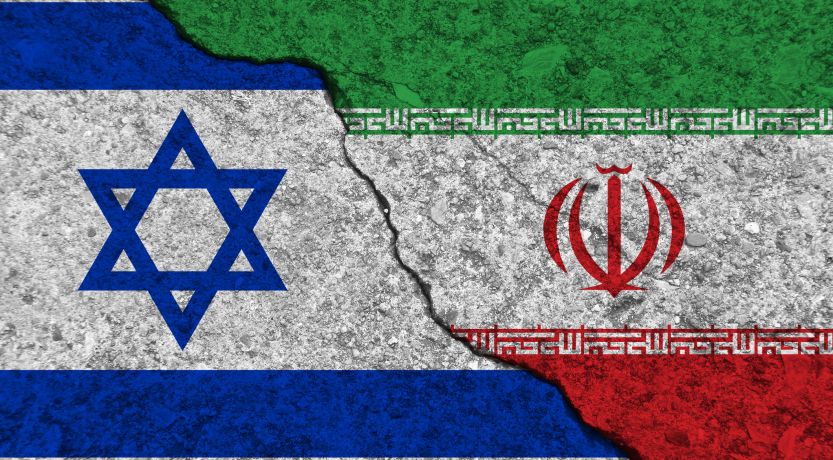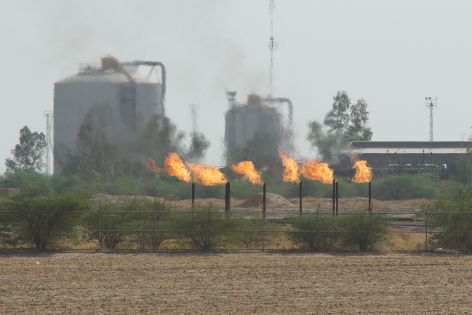The Israel-Iran Conflict and Bible Prophecy
Surprise attacks on Iran by Israel and the United States have created more fear and unrest in the Middle East. Is the stage being set for the fulfillment of Bible prophecy?

Achisatha Khamsuwan/iStock via Getty Images
UPDATED: June 23, 2025, 10:50 a.m. (Central time)
On June 13, Israel launched an attack on Iran’s nuclear facilities. The attack targeted key sites across the country and destroyed significant portions of Iran’s nuclear infrastructure and killed several senior scientists and military leaders.
The attack was the result of extensive behind-the-scenes planning by Israeli intelligence and defense forces. The operation crippled much of Iran’s ballistic missile capability, severely limiting its ability to mount an effective counterattack. While Iran has responded with counterattacks, the vast majority of their missiles and drones have been intercepted.
Then, on June 21, the United States bombed three of Iran’s nuclear facilities—an action that, to date, has been unchallenged by Iran.
A major question now is whether Iran’s lack of preparedness and weakened position will lead to a shift in the balance of power in the Middle East. Furthermore, is the international community now beginning to view Israel more as an aggressor than a victor?
Both of these outcomes may play into Bible prophecy.
Iran and the Muslim influence in the Middle East
To gain a better understanding of these events, it’s essential to have some background knowledge of the Muslim people.
Some 4,000 years ago, God promised Abram (whose name God later changed to Abraham) a son by his wife (Genesis 15:1-4; 17:5; 18:10). But before that son was born, Abram had a son, named Ishmael, through his wife’s maidservant. Animosity began to develop between the two children not long after Isaac, the promised son, was born.
Ishmael ultimately left, and his descendants are among the Arab peoples today.
Since Iran has the fourth-largest oil reserves and the second-largest natural gas reserves in the world, its influence in the Middle East cannot be ignored.
Years later, Isaac’s son Esau, the twin brother of Jacob, married a daughter of Ishmael (Genesis 28:9). Their descendants also live in the Middle East. The Jews are among the descendants of Jacob, and since the birthright promises went through Isaac and Jacob instead of Ishmael and Esau, the animosity between these descendants also continues to this day.
Around the late sixth century, a man named Muhammad formed a religion known as Islam, which served to unify the Arab peoples, as well as others who surrounded them, including the Persians. These people became known as Muslims.
After Muhammad’s death, a division occurred over who would be considered his rightful successor. This created two distinct groups of Muslims—the Sunnis and the Shias. Over 90 percent of the world’s Muslims are Sunni, so it is not surprising that conflicts have arisen between these two sects. (For a more detailed explanation of the Sunni-Shia divide, read pages 45-47 of our booklet The Middle East in Prophecy.)
This becomes significant when we consider that the nation of Iran is mostly Shia and is governed by a Shia theocracy. Iran is also largely composed of Persians, not Arabs. These two factors explain the historic divisions and lack of friendship between Iran and other Sunni-led Muslim nations.
Since Iran has the fourth-largest oil reserves and the second-largest natural gas reserves in the world, its influence in the Middle East cannot be ignored.
Even though Iranians are among the minority in the Muslim world, their natural resources have allowed them to maintain their influence.
How Iran has maintained its power
Oil is the lifeblood of Iran’s economy.
Through the sale of oil and natural gas, Iran has not only built the third-largest military force in the Middle East, but also financed proxy groups such as Hamas, Hezbollah and the Houthis. In the past, these groups have advanced Iran’s regional influence, challenging not only Israel but also Sunni-led governments across the Muslim world.
Through revenue generated from oil and gas exports, Iran has invested heavily in the development of its missile program, resulting in one of the region’s largest and most diverse ballistic missile arsenals. This arsenal serves both as a deterrent against foreign intervention and as a means of projecting power across the region.
Through revenue generated from oil and gas exports, Iran has invested heavily in the development of its missile program. AL-Travelpicture/iStock via Getty Images
Over the years, various countries have imposed sanctions and trade restrictions on Iran in an effort to curb its nuclear ambitions. In 2015, Iran and several world powers signed the Joint Comprehensive Plan of Action (JCPOA), which eased many of these sanctions in exchange for Iran limiting its nuclear activities and allowing inspections.
However, in 2018, the United States withdrew from the agreement and reimposed sanctions, because its leaders believed Iran was secretly continuing efforts to develop a nuclear weapon.
In early June the Board of Governors of the global nuclear watchdog International Atomic Energy Agency (IAEA) formally declared Iran in breach of its nonproliferation obligations, raising serious global concerns about its nuclear intentions.
Israeli intelligence has continued to see evidence of progress toward nuclear weapons in Iran. Concerns that Iran was close to having the ability to complete several nuclear bombs and posed an imminent threat prompted Israel’s June 13 attack. The strikes destroyed or badly damaged three nuclear facilities, including Natanz, Isfahan and Fordow, and significantly degraded Tehran’s nuclear and missile capacities.
Then, on June 21, the United States added an exclamation point when it dropped its bombs.
Israel’s Prime Minister Benjamin Netanyahu said that U.S. President Donald Trump’s “bold decision to target Iran’s nuclear facilities with the awesome and righteous might of the United States will change history.”
But how will that history be changed?
When we consider the damage Israel has inflicted on Iran and its proxy groups over the past year and a half, it seems Iran may not be as powerful as it has projected itself to be.
Through a combination of its intelligence and military capabilities, Israel has delivered a series of strategic blows that have significantly weakened Iran’s power in the region. These developments have led analysts to suggest that Iran’s influence in the Middle East may be in significant decline.
A power shift ahead?
Although Egypt and other Sunni-majority nations have expressed disapproval of both the U.S. and Israeli attacks on Iran, they have stopped short of outright condemnation. Their primary concern is preserving the regional stability that, despite tensions, has largely been maintained over the past several decades.
Egypt now finds itself in a delicate position. While it may not fully support Israel’s actions, it maintains a longstanding peace treaty with Israel, signed in 1979, that provides it with U.S. military and economic aid.
At the same time, Egypt must tread carefully in its approach to Iran. Although diplomatic relations were severed in 1980 following Egypt’s peace with Israel and Iran’s Islamic Revolution, more recent regional dynamics have reopened limited channels of engagement between the two.
With Iran’s regional influence now visibly weakened, we may witness Sunni nations, particularly Egypt, asserting greater influence in the Middle East in the near future.
Nevertheless, Cairo remains deeply wary of Tehran. Egypt, one of the top four military powers in the Middle East, and other Sunni Arab states may view Iran’s exposed vulnerabilities as an opportunity to expand their own influence in the region and reshape the Middle East’s balance of power.
This fits with Bible prophecy, which indicates that the Sunni nations, not the Shia, will be the dominant force in the years to come.
Daniel 11 describes a future power it calls the king of the South that will fight the king of the North. (North and south in this context are generally in relation to Jerusalem.) These prophecies have both a historical and end-time fulfillment. (For a detailed explanation of Daniel 11, read our article “Daniel 11: The Most Detailed Prophecy in the Bible.”)
The end-time fulfillment will occur just before the return of Jesus Christ. Today, Egypt is one of the most prominent nations south of Jerusalem and has significant military strength. With Iran’s regional influence now visibly weakened, we may witness Sunni nations, particularly Egypt, asserting greater influence in the Middle East in the near future.
Egypt will likely not wield this power alone, but will likely lead a group of nations that could include Saudi Arabia and other North African and Middle Eastern countries.
Just before the return of Christ, these nations will form a confederacy to fight against Israel (Psalm 83:4-5).
Israel is now being seen as an aggressor
Even though Israel is saying that its current actions are only to defend itself, not everyone sees Israel’s recent actions as honorable. We should watch closely Israel’s relationship with its neighbors, particularly those to the south.
When Hamas, funded by Iran, carried out its brutal attack against Israel on Oct. 7, 2023, killing approximately 1,200 Israelis and kidnapping over 250 others, much of the international community initially viewed Israel’s retaliation as justified.
However, as the conflict has dragged on, with estimates of over 57,000 Palestinians killed, global sentiment has begun to shift. Increasingly, Israel is portrayed as an aggressor. Its most recent strikes on Iran have further fueled accusations that Israel is abandoning efforts for peace and instead perpetuating violence.
According to Bible prophecy, anti-Semitism (hostility against the Jewish people) is prophesied to intensify in the last days. According to Ezekiel 35:5-6, this “ancient hatred,” rooted in the enmity between Ishmael and Isaac, will culminate in a confederacy of Arab nations seeking the destruction of Israel.
What will happen next?
Israel is surrounded by hostile neighbors. Although it’s sometimes ranked only as the fourth most powerful military in the Middle East, its strategic advantage lies in its close relationship with the United States, which provides it access to advanced weaponry far superior to that of Iran and other Muslim nations.
Despite Iran’s threats against both Israel and the United States, recent events have highlighted the limitations of Iran’s conventional military capabilities when faced with the technological superiority of Israel and the U.S.
Despite Iran’s threats against both Israel and the United States, recent events have highlighted the limitations of Iran’s conventional military capabilities.
Since its founding as a nation in 1948, Israel has avoided military defeat largely thanks to U.S. support. But just as Benjamin Netanyahu said, these recent events will affect the Middle East and “change history.”
Prophecy reveals that another superpower—referred to as the “king of the North”—will rise in Europe.
According to Daniel 11:40-43, when Muslim nations unify into the “king of the South,” they will “attack” this European power, provoking a fierce response. Europe will retaliate with overwhelming force, crushing the “king of the South.”
Israel will be caught in the cross fire. As prophesied in Zechariah 14:1-2, half the city will be taken into captivity, and the state of Israel will fall.
Yet this tragic sequence of events is not the end. Shortly afterward, Jesus Christ will return—not only to deliver the Jewish people, but to rescue all the descendants of Jacob, including modern-day nations such as the United States and Britain, who will also have fallen to this future European power.
To learn more about the world scene in the end time, read “World News and End-Time Prophecy: The Nations.”
Continue to watch the Middle East
Yes, the events we are witnessing in the news will ultimately result in a power shift in the Middle East. Iran’s considerable regional influence will not last. A new and more powerful influence is prophesied to come on the scene, both in the Middle East and in Europe.
Israel, once widely seen as a nation seeking peace, is increasingly perceived as an aggressor. Although it still enjoys support from the United States, prophecy reveals that this relationship, rooted in a shared heritage as brother nations, will eventually be broken. Zechariah 11:14 foretells that the bond between these two nations will be severed.
What is unfolding before our eyes is the preparation for a series of global events that, as Jesus warned in Matthew 24:22, will escalate to the point of threatening human survival itself.
Yet, there is hope.
God will intervene by sending Jesus Christ to rescue humanity, establish the Kingdom of God on earth and bring lasting peace to all nations.
Continue to watch world events, especially the Middle East, and pray earnestly for the return of Jesus Christ.
Date Posted: June 23, 2025



